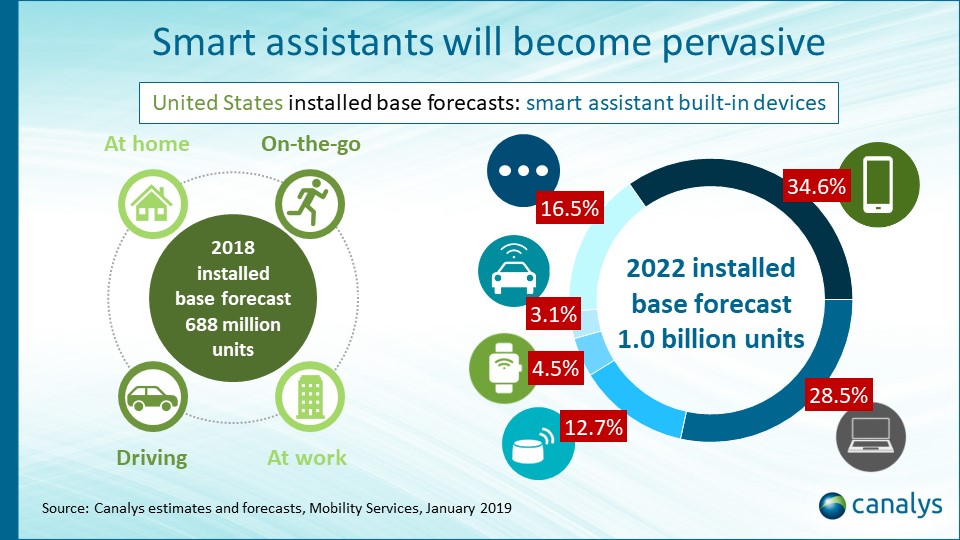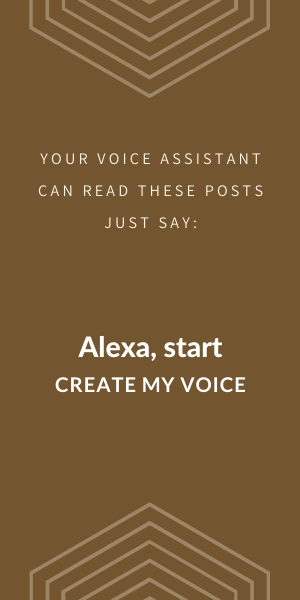Smart Speakers are leading a change in how we consume information. It's easier to just ask Alexa or ask Google, than it is to log into the computer (or smartphone) and type in the question. But is voice just for Smart Speakers?
Listen to Google voice read post :
Amazon's Announcement
Amazon recently announced that they had sold over 100 million Alexa Smart Speaker devices. While that sounds like a lot of devices, what is notable, is only 6 months ago, Canalys predicted that by the end of 2018 there would be a total of 100 million smart speakers and Amazon would account for about 50% of them. Let me say that differently, Amazon just announced that they sold twice as many devices than predicted just 6 months earlier. But more important than Amazon beating a prediction, is the implication to the overall prediction of the rate of adoption. Canalys predicted that by the end of 2018, there would be a total of 100 million devices sold. If Amazon alone sold that many devices, then once you include devices sold by Google, Apple, Sonos, Lenovo, and the many other makers of smart speakers, the total number of Smart Speakers is much higher. The takeaway is that the adoption of Smart Speakers is happening much faster than predicted.

In May of 2018 Canalys' 5 year Smart Speaker adoption prediction shows both Amazon and Google having about 100 million devices deployed by 2022.
Google's Announcement
Not to be outdone, Google announced that the Google Assistant will be on 1 billion devices. The fight for the "King of the Voice First" interface continues to escalate. For Google to claim 1 billion devices, they are including the 100's of millions of Android smartphones. Which brings up a good question, is the goal of Amazon, Google, and the others, to have a Smart Speaker in every room, office, and automobile and as recently reported by TheStreet at CES in every appliance, including refrigerators, faucets, ovens, washing machines, instant pots, pet cameras, showers, and even toilets, (you can't make this stuff up). The alternative narrative regarding the recent announcements regarding voice devices is that Smart Speakers are just one device which is leading us toward a shift in how we interact with information - towards verbal, Voice First?
I think that Google is correct in highlighting that their Voice Enabled interface called Google Assistant is available for us to use. It highlights that the shift to Voice First is not limited to Smart Speakers. We are starting to shift how we get information, from sitting at computers or staring at our phones to using our voice. We are starting to ask for and listen to information. For a discussion about what a Brand looks like in a Voice First world, see the blog post titled "What does a Verbal Brand Look Like?"
New Predictions
Canalys has recently provided a new prediction for 2022. The ubiquitous adoption of Voice First devices is now a given. Nicole Peng, Canalys Senior Director of Mobility says it this way, "The adoption of smart assistants is no longer a question of price or availability", "2018 was a key year for voice, with smart speakers bringing the technology to the fore." Canalys now predicts that by 2022, there will be 1.6 billion smart assistant-compatible devices in the US. For perspective, that's 5 devices for every man, woman, and child in the US.
Voice is no longer a novelty. Now is the time to develop a voice strategy for your content. If you publish content, Create My Voice can help!
[NOTE: This blog post has automatically been processed by the CreateMyVoice BlogToAudio reader. Which means that in addition to reading it, you can hear it on any Amazon Alexa or Google Assistant device, just by asking. Just say to your Google Assistant, "Hey Google, Talk to Create My Voice". And if you prefer to talk to Alexa, just say, "Alexa, Start Create My Voice".]


